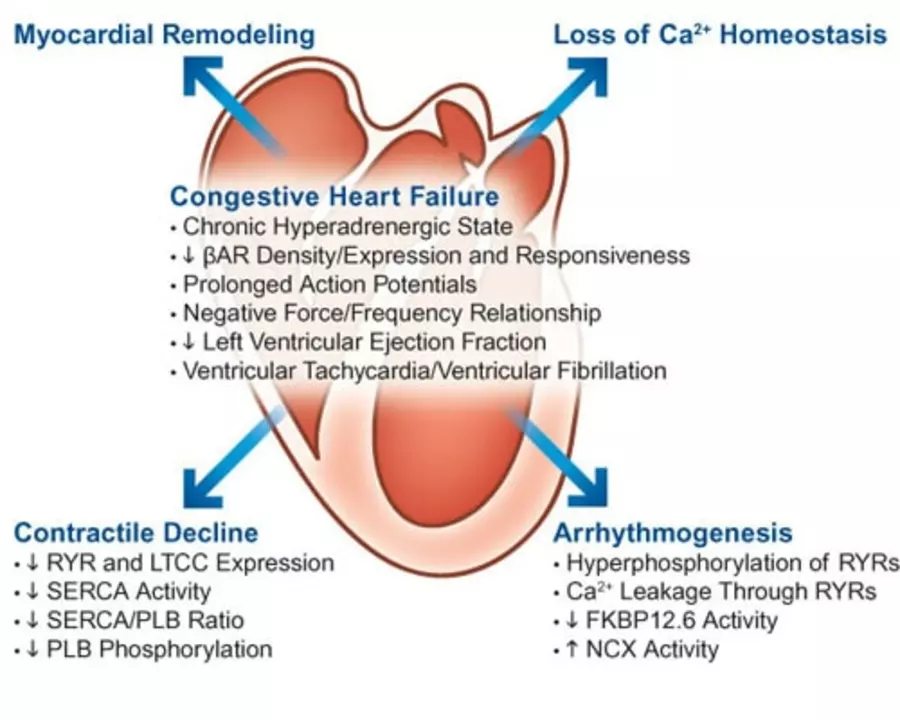Heart Failure and Mental Health: Coping with the Emotional Challenges
 May, 6 2023
May, 6 2023
Understanding the Connection Between Heart Failure and Mental Health
It is crucial for us to recognize the link between heart failure and mental health. Heart failure is a chronic condition that impacts not only our physical well-being but also our emotional and mental health. It is common for individuals with heart failure to experience feelings of anxiety, depression, and stress. These mental health challenges can further exacerbate the symptoms of heart failure, creating a vicious cycle that is difficult to break. In this section, we will explore the connection between heart failure and mental health, and understand why it is essential to address both aspects of our well-being.
Recognizing the Emotional Impact of Heart Failure
Living with heart failure can take a significant toll on our emotional well-being. The constant worry about our health, the limitations placed on our daily activities, and the need to manage various medications can lead to feelings of sadness, frustration, and even anger. It is essential to recognize these emotions and allow ourselves to process them. By acknowledging the emotional impact of heart failure, we can begin to develop strategies to cope with these challenges and maintain a positive outlook on life despite our condition.
Managing Anxiety and Stress
Heart failure can cause a great deal of anxiety and stress, as we may constantly worry about our health and the future. It is vital to find ways to manage these feelings to prevent them from worsening our heart failure symptoms. Practicing relaxation techniques such as deep breathing, meditation, and progressive muscle relaxation can help reduce anxiety and stress. Additionally, engaging in activities that bring us joy and help us feel connected to others can also alleviate stress and promote a sense of well-being.
Overcoming Depression
Depression is a common mental health challenge faced by individuals with heart failure. It is essential to address this issue, as untreated depression can negatively impact our physical health and overall quality of life. If we suspect that we are experiencing symptoms of depression, such as persistent sadness, loss of interest in activities, or changes in sleep and appetite, it is crucial to seek professional help. Treatment options for depression may include therapy, medication, or a combination of both.
Building a Support System
Having a strong support system is crucial when coping with the emotional challenges of heart failure. Our friends, family, and healthcare providers can provide valuable emotional support, encouragement, and practical assistance as we navigate the complexities of living with heart failure. Joining a support group for individuals with heart failure can also be beneficial, as it allows us to connect with others who understand our experiences and share coping strategies.
Staying Active and Engaged
Maintaining an active and engaged lifestyle is essential for promoting mental health and overall well-being. While heart failure may require us to modify our activities, it is crucial to continue participating in activities that bring us joy and provide a sense of purpose. Engaging in hobbies, volunteering, or spending time with loved ones can help us stay connected and maintain a positive outlook on life.
Practicing Self-Care
Self-care is an integral part of coping with the emotional challenges of heart failure. It is essential to prioritize our own well-being and take time to engage in activities that promote relaxation, stress reduction, and overall mental health. This may include activities such as taking a warm bath, reading a book, or engaging in a creative outlet. By prioritizing self-care, we can ensure that we are better equipped to manage the emotional challenges of living with heart failure.
Setting Realistic Goals and Expectations
Living with heart failure can necessitate making adjustments to our daily activities and long-term goals. It is essential to set realistic expectations for ourselves and be willing to adjust our plans as needed. By setting achievable goals, we can maintain a sense of accomplishment and motivation, which is crucial for promoting our mental health and well-being.
Developing Effective Communication Skills
As we cope with the emotional challenges of heart failure, it is crucial to develop effective communication skills. This includes not only expressing our feelings and needs to others but also listening and responding to the needs of our loved ones. By fostering open and honest communication, we can strengthen our support system and ensure that our emotional needs are met.
Seeking Professional Help
Finally, it is essential to seek professional help if we are struggling to manage the emotional challenges of heart failure on our own. Mental health professionals, such as therapists and counselors, can provide valuable support and guidance as we navigate the complexities of living with heart failure. They can help us develop effective coping strategies, manage our emotions, and ultimately improve our overall quality of life.

sarat babu
May 6, 2023 AT 15:28Matt Renner
May 7, 2023 AT 07:47Ramesh Deepan
May 7, 2023 AT 11:11Wayne Rendall
May 7, 2023 AT 21:19Ifeoluwa James Falola
May 8, 2023 AT 21:19Adam Phillips
May 8, 2023 AT 23:47Julie Lamb
May 9, 2023 AT 00:03april kakoske
May 9, 2023 AT 10:05Pradeep Meena
May 9, 2023 AT 21:02Rishabh Jaiswal
May 10, 2023 AT 05:45May Zone skelah
May 10, 2023 AT 23:35Dale Yu
May 11, 2023 AT 18:44Kshitij Nim
May 12, 2023 AT 03:40Scott Horvath
May 12, 2023 AT 05:29Armando Rodriguez
May 13, 2023 AT 02:30jennifer sizemore
May 13, 2023 AT 11:45Ramesh Deepan
May 13, 2023 AT 17:52matt tricarico
May 13, 2023 AT 22:41